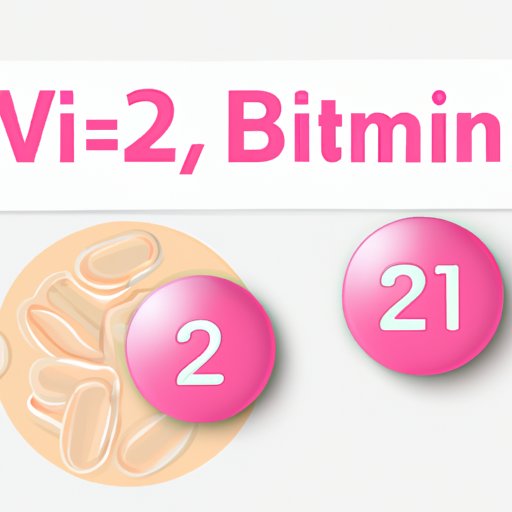
I. Introduction
Vitamin B12 has become an increasingly popular topic in the world of health and wellness. It’s an essential nutrient that supports many bodily functions, including the production of red blood cells and DNA. However, understanding how much vitamin B12 you need can be overwhelming. In this article, we’ll explore the recommended daily intake for different groups of individuals and discuss personalized vitamin B12 needs to maximize benefits and minimize risks.
II. The Importance of Vitamin B12 and How Much You Really Need
Vitamin B12 is a water-soluble vitamin that plays a vital role in maintaining good health. It helps the body convert food into energy, supports neurological function, and aids in the formation of red blood cells. The recommended daily intake of vitamin B12 for adults is 2.4 micrograms, but the amount varies depending on age, sex, and other factors.
There are several forms of vitamin B12, including cyanocobalamin, hydroxocobalamin, and methylcobalamin. While cyanocobalamin is the most commonly used form in supplements, methylcobalamin is considered the most effective as it’s easily absorbed by the body.
III. Are You Taking Enough Vitamin B12? How to Find Your Ideal Intake
Vitamin B12 deficiency is not uncommon and can lead to anemia, fatigue, weakness, and neurological problems. If you’re experiencing any of these symptoms, you may need more vitamin B12. Blood tests can determine your vitamin B12 levels, and your healthcare provider can provide guidance on supplementing if necessary.
The best way to get vitamin B12 is through diet, and good sources include animal products such as meat, dairy, and eggs. Vegetarians and vegans may need to take a supplement or consume fortified foods to ensure they’re getting enough.
IV. Vitamin B12 Dosage: A Comprehensive Guide to Optimal Health
Vitamin B12 dosages can vary depending on your age, diet, and lifestyle habits. Pregnant or lactating women may need higher doses, and those over age 50 may require supplements to help with absorption. Supplements come in various forms such as capsules, tablets, and sprays, with dosages ranging from 500 micrograms to 5,000 micrograms. It’s essential to consult with a healthcare provider before taking any supplements to ensure you’re taking the right dose.
V. Understanding Vitamin B12 Deficiency and How Much You Need to Prevent It
Vitamin B12 deficiency occurs when the body does not have enough vitamin B12 to function correctly. Risk factors include a poor diet or digestive problems that prevent the body from absorbing nutrients effectively. To prevent deficiency, it’s crucial to get adequate vitamin B12 through diet or supplements. Injections may be required if you’re unable to absorb vitamin B12 through food or supplements.
Vitamin B12 deficiency has been linked to certain health conditions, including anemia and neurological disorders. It’s essential to pay attention to your vitamin B12 intake to minimize the risk of developing these conditions.
VI. Why One Size Doesn’t Fit All When it Comes to Vitamin B12: Personalizing Your Intake
Personalizing vitamin B12 intake is crucial, as every individual has different needs. An individual’s genetic makeup, age, lifestyle, and other factors can all impact vitamin B12 needs. Genetic testing can determine whether you have a mutation in the MTHFR gene, affecting vitamin B12 metabolism. Adjusting your vitamin B12 intake based on your personalized needs can optimize nutrient absorption, leading to potential health benefits.
VII. Maximizing the Benefits of Vitamin B12: Finding the Sweet Spot in Dosage
Proper vitamin B12 intake can lead to numerous health benefits, including increased energy, improved mood, and better cognitive function. To find your optimal dosage, it’s essential to work with a healthcare professional and monitor your vitamin B12 levels regularly. While vitamin B12 overdose is rare, excessive intake can lead to adverse symptoms such as diarrhea and skin rash.
VIII. Conclusion
Vitamin B12 is an essential nutrient that supports many bodily functions. Adequate vitamin B12 intake can be achieved through diet or supplementation. To avoid deficiency and maximize benefits, it’s essential to ensure you’re taking the right amount, as individual needs vary depending on various factors. Keep this comprehensive guide in mind to optimize your vitamin B12 intake and prioritize your health.





